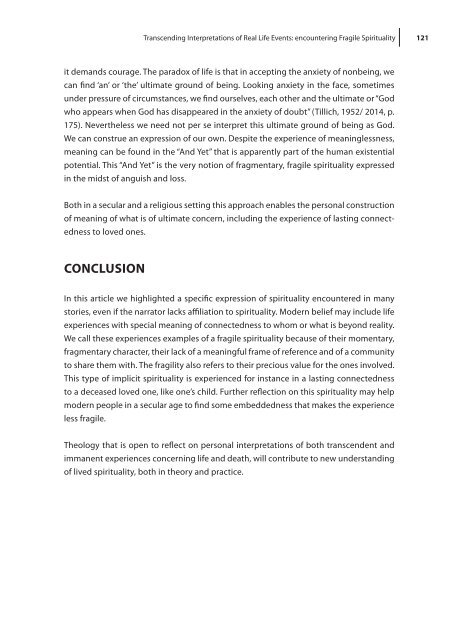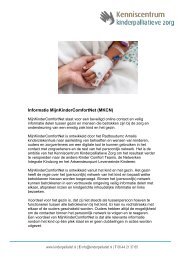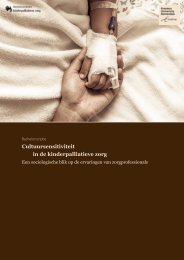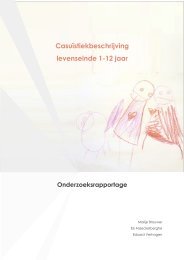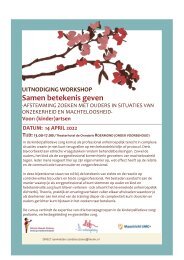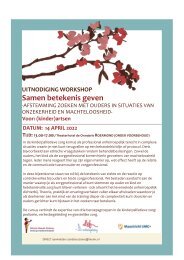Unveiling a fragile spirituality: Experiences of connectedness in pediatric palliative care
You also want an ePaper? Increase the reach of your titles
YUMPU automatically turns print PDFs into web optimized ePapers that Google loves.
Transcend<strong>in</strong>g Interpretations <strong>of</strong> Real Life Events: encounter<strong>in</strong>g Fragile Spirituality 121<br />
it demands courage. The paradox <strong>of</strong> life is that <strong>in</strong> accept<strong>in</strong>g the anxiety <strong>of</strong> nonbe<strong>in</strong>g, we<br />
can f<strong>in</strong>d ‘an’ or ‘the’ ultimate ground <strong>of</strong> be<strong>in</strong>g. Look<strong>in</strong>g anxiety <strong>in</strong> the face, sometimes<br />
under pressure <strong>of</strong> circumstances, we f<strong>in</strong>d ourselves, each other and the ultimate or “God<br />
who appears when God has disappeared <strong>in</strong> the anxiety <strong>of</strong> doubt” (Tillich, 1952/ 2014, p.<br />
175). Nevertheless we need not per se <strong>in</strong>terpret this ultimate ground <strong>of</strong> be<strong>in</strong>g as God.<br />
We can construe an expression <strong>of</strong> our own. Despite the experience <strong>of</strong> mean<strong>in</strong>glessness,<br />
mean<strong>in</strong>g can be found <strong>in</strong> the “And Yet” that is apparently part <strong>of</strong> the human existential<br />
potential. This “And Yet” is the very notion <strong>of</strong> fragmentary, <strong>fragile</strong> <strong>spirituality</strong> expressed<br />
<strong>in</strong> the midst <strong>of</strong> anguish and loss.<br />
Both <strong>in</strong> a secular and a religious sett<strong>in</strong>g this approach enables the personal construction<br />
<strong>of</strong> mean<strong>in</strong>g <strong>of</strong> what is <strong>of</strong> ultimate concern, <strong>in</strong>clud<strong>in</strong>g the experience <strong>of</strong> last<strong>in</strong>g <strong>connectedness</strong><br />
to loved ones.<br />
CONCLUSION<br />
In this article we highlighted a specific expression <strong>of</strong> <strong>spirituality</strong> encountered <strong>in</strong> many<br />
stories, even if the narrator lacks affiliation to <strong>spirituality</strong>. Modern belief may <strong>in</strong>clude life<br />
experiences with special mean<strong>in</strong>g <strong>of</strong> <strong>connectedness</strong> to whom or what is beyond reality.<br />
We call these experiences examples <strong>of</strong> a <strong>fragile</strong> <strong>spirituality</strong> because <strong>of</strong> their momentary,<br />
fragmentary character, their lack <strong>of</strong> a mean<strong>in</strong>gful frame <strong>of</strong> reference and <strong>of</strong> a community<br />
to share them with. The fragility also refers to their precious value for the ones <strong>in</strong>volved.<br />
This type <strong>of</strong> implicit <strong>spirituality</strong> is experienced for <strong>in</strong>stance <strong>in</strong> a last<strong>in</strong>g <strong>connectedness</strong><br />
to a deceased loved one, like one’s child. Further reflection on this <strong>spirituality</strong> may help<br />
modern people <strong>in</strong> a secular age to f<strong>in</strong>d some embeddedness that makes the experience<br />
less <strong>fragile</strong>.<br />
Theology that is open to reflect on personal <strong>in</strong>terpretations <strong>of</strong> both transcendent and<br />
immanent experiences concern<strong>in</strong>g life and death, will contribute to new understand<strong>in</strong>g<br />
<strong>of</strong> lived <strong>spirituality</strong>, both <strong>in</strong> theory and practice.


